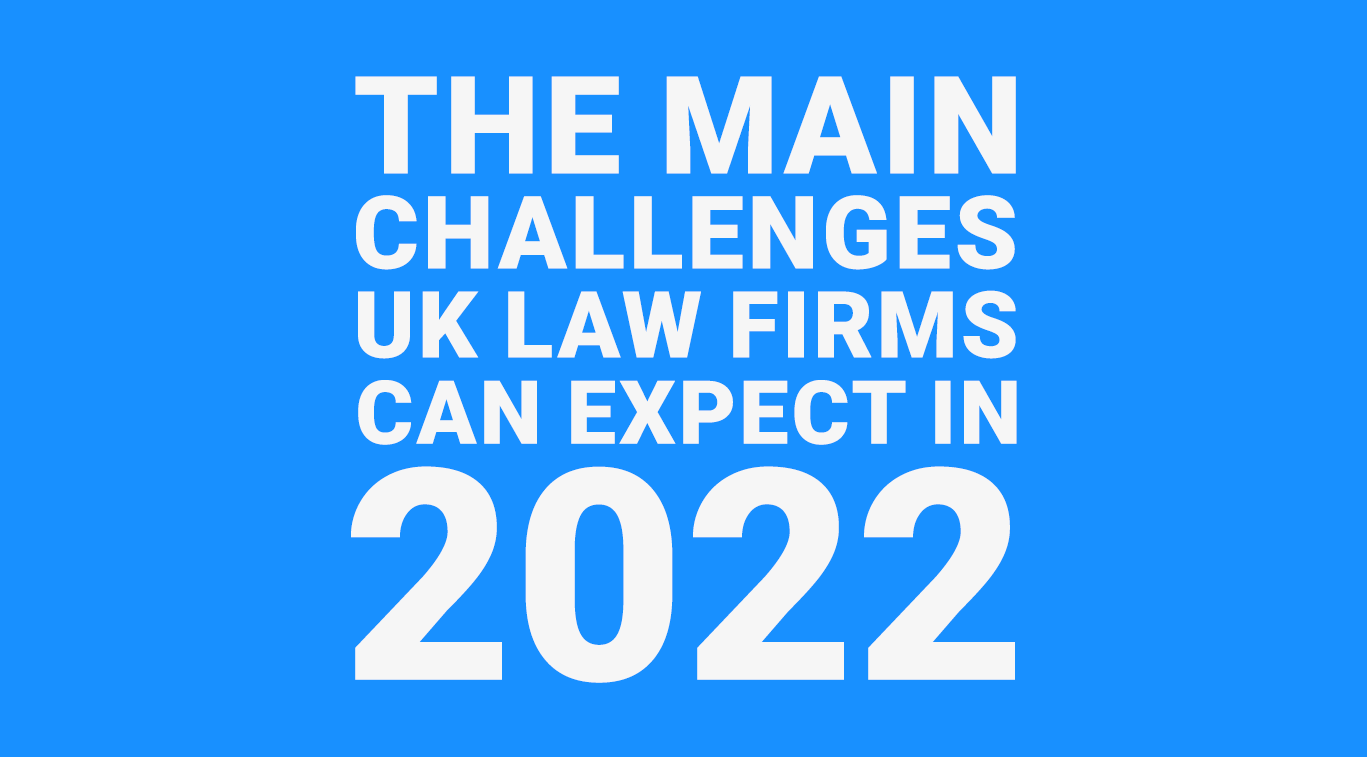The Main Challenges UK Law Firms Can Expect In 2022

Written by Fatima Freifer
Blogger

Introduction
As the United Kingdom continues to undergo economic transformation, major changes have emerged in the legal industry. The largest firms have made significant strides in meeting the challenges posed by coming years and encouraging efficiency through modernisation. Since 2022, UK law firms using artificial intelligence and machine learning have had significant presence in daily court proceedings as well as within law firms themselves. [1] These advancements have heightened the debate over legal workflow automation software and have caused many firms to rethink their hiring practices. In addition, governmental policies are anticipated to create a drastic shift in revenue shares between large law firms and smaller firms. [2]
Law firms are facing new challenges in the form of market disruptions both internally and from consumers, who require firms to change their strategy in order to retain them. Globalisation and technology in the legal sector has given rise to a more competitive environment for UK-based law firms. In addition to this, client services are quickly becoming a market differentiator for the industry. Clients are also moving towards a transactional approach over advisory approach due to its cost-effectiveness. Finally, increasing legal budget constraints have led to an increase in demand for certain services. [3]
Staff Retention
It can be difficult to leave the legal profession. Lawyers are expected to have a high level of legal knowledge and to be competent in a variety of areas of the law. They cannot serve their clients if they do not have this working knowledge. Nonetheless, many lawyers are leaving the profession in search of a less hectic schedule, with some citing low pay as one of the primary reasons. [4]
One major reason is that lawyers are finding it difficult to keep up with societal technological changes, which is slowing down their careers. Furthermore, there are not enough opportunities for them to advance in their careers because firms have rigid hierarchies that make it difficult for people at lower levels to move up. In its monthly survey, the Office of National Statistics noted that the annual turnover of legal services in the UK in 2020 remained the same as in 2019, while other UK services fell by 14%. [5]
Client retention
One of the primary goals of any law firm’s marketing and business development department is to implement client retention strategies. Effective client retention efforts can mean the difference between exceeding or failing to meet a company’s overall business development targets for the year. It is not enough to just bring in new customers; it is also necessary to keep existing customers from leaving.
There is also a continuing trend of new types of legal services and new forms of legal service delivery. Firms must be razor sharp when it comes to managing their clients’ experiences. Clients’ service and experience expectations are constantly rising. They expect an overall experience to be supported by technology that facilitates communication and saves time. The impact of technology on legal services includes, but is not limited to, client portals and a shift away from traditional meetings in commercial office space, as well as immediate responses to emails and queries, flexibility, and transparency. [6]
Legal Technology Impact
Another challenge that UK law firms can expect is the impact of technology on law and how this has increased competition within the market. For example, legal tech companies now offer services like legal document management, which was traditionally a service offered by law firms only. In addition, there are now many legal tech software programs available for purchase. The legal sector has been completely transformed as a result of digital transformation, which has resulted in new processes and workflows. Many new legal and technological solutions are introduced on a daily basis, making it difficult for a law firm to determine which technology is best for them.
Consumer behaviour is changing as a result of recent technological changes in the market, with clients’ expectations rising by the day. This compels legal representatives to implement stringent policies in order to remain relevant and competitive in the industry.
Due to increased competition, law firms are finding it difficult to acquire new clients while also retaining current customers. More law firms are being established on a daily basis, creating a pool from which clients can choose. To remain relevant, law firms must lower their prices in order to attract more clients, which has an impact on their profitability and revenues.
To remain relevant in a competitive industry, law firms should implement policies that encourage innovation and creative thinking. Policies should always be customer-focused while also preserving the organization’s primary goals. They should also use cutting-edge technology to assist legal representatives in staying on top of and meeting deadlines, storing and locating documents more efficiently, and streamlining legal processes. [7]
Conclusion
While law firms from the UK have always been on the forefront of legal technology, this industry has matured to a point where legal tech innovations are more frequently supporting client facing technologies than internal systems. While this shift presents a challenge for firms, there are also great opportunities for those able to capitalise on them. Future UK law firms can be expected to change dramatically these next five years in terms of the broader makeup of their clients, the way they operate, and the expectations of their internal staff. While the worldwide economy has been forging ahead at a steady pace due to improving technology, UK law firms are navigating a path fraught with competition from all corners and a push to overcoming these obstacles is dependent on their embrace for modifications in the working environment. [10]
References
[1] WHAT WILL BE THE BIGGEST CHALLENGES FACING THE LEGAL INDUSTRY IN 2021 AND BEYOND? https://www.britishlegalitforum.com/news/what-will-be-the-biggest-challenges-facing-the-legal-industry-in-2021-and-beyond/
[2] Legal Industry Challenges And Marketing Opportunities In 2022, TEAM LINCHPIN, MARCH 30, 2022 https://linchpinseo.com/legal-industry-challenges-and-opportunities/
[3] Trending commercial issues to know about in 2022, 22 March 2022, https://www.lawcareers.net/Explore/Features/25012022-Trending-commercial-issues-to-know-about-in-2022
[4] Retaining employees: The toughest post-pandemic challenge? Katie Heiden, https://www.locktonsolicitors.co.uk/news/retaining-employees-the-toughest-post-pandemic-challenge.html
[5] Staff turnover rates in the legal Industry, at firm and sector level: 2017 to 2018, Release date 1 July 2021 https://www.ons.gov.uk/employmentandlabourmarket/peopleinwork/employmentandemployeetyp
es/adhocs/13421staffturnoverratesinthelegalindustryatfirmandsectorlevel2017to2018
[6] Legal Client Retention Strategies: What Every Law Firm Needs to Know,
Vonage Staff, https://www.vonage.co.uk/resources/articles/legal-client-retention-strategies/
[7] What Are Law Firms’ 10 Biggest Client Retention Challenges? November 29, 2021, https://www.lexisnexis.com/community/insights/legal/b/thought-leadership/posts/top-10-law-firm-client-retention-challenges
[8] UK Legal System and Adaptability, Fatima Freifer, https://goodlawsoftware.co.uk/the-uk-legal-system-and-its-adaptability-in-the-face-of-technological-change
[9] Britain’s Trajectory as a Testing Nation, Fatima Freifer, https://goodlawsoftware.co.uk/britains-trajectory-as-a-testing-nation
[10] How Legal Tech Will Shape Up Law Industry, Fatima Freifer, https://goodlawsoftware.co.uk/how-legal-tech-will-shape-up-the-law-industry








